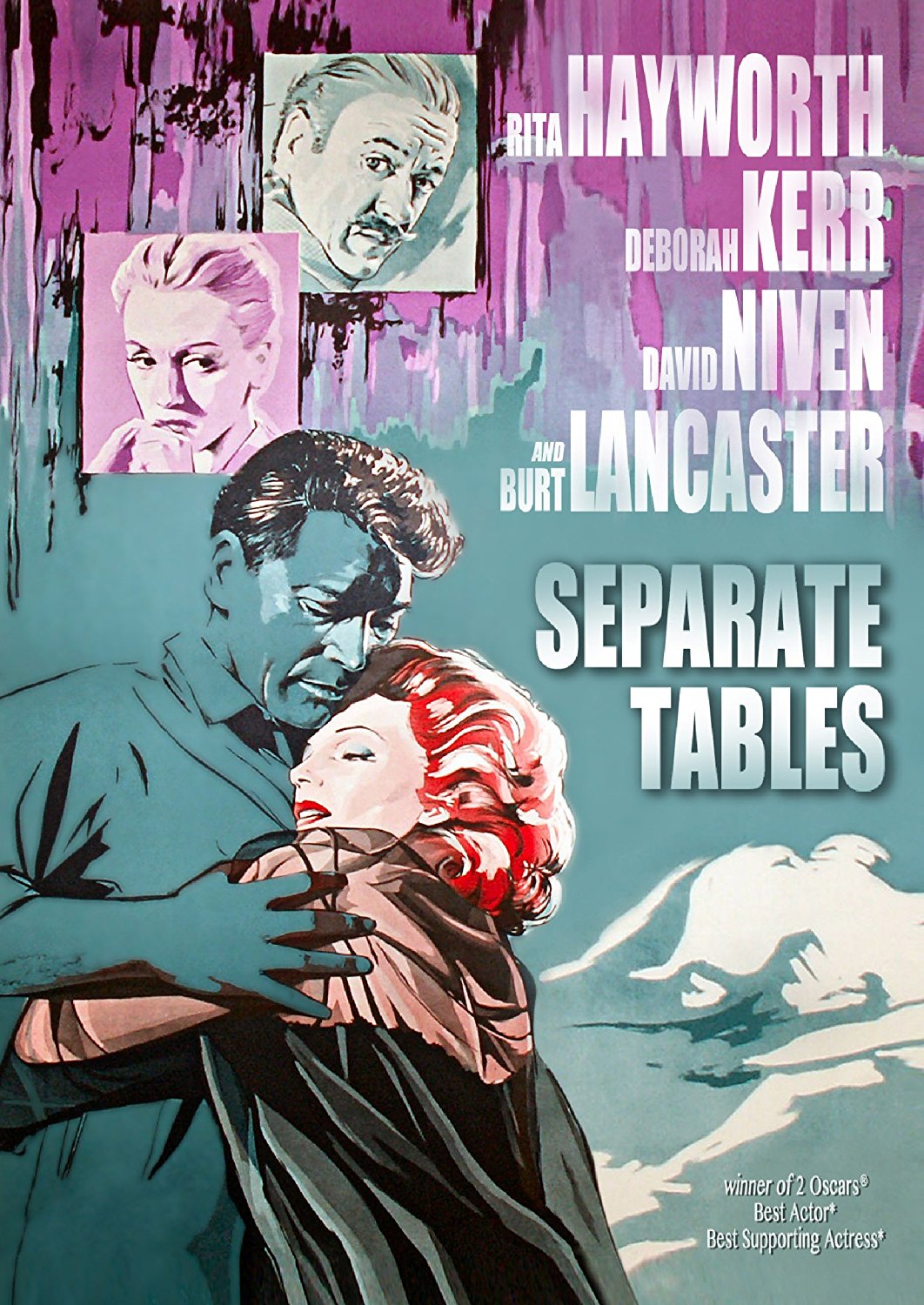Separate Tables (1958) starring Rita Hayworth, Deborah Kerr, David Niven, Burt Lancaster, Wendy Hiller
Synopsis of Separate Tables
A look into the lives of several residents at a seaside hotel …. Where guest have their meals at separate tables. They all share one trait – loneliness. John Malcolm is a hard-drinking man, engaged to the hotel owner Pat Cooper. His life is turned upside down…, When a former love, Ann Shankland shows up after she hears of his engagement. She clearly wants him back. But he sees nothing positive that can result from renewing their relationship. Her narcissism masks a deep fear of growing old alone and unloved.
There is also the domineering Mrs. Railton-Bell. She’s a highly opinionated woman. And her meek, quiet daughter Sybil. Finally, there is Major Angus Pollock. A man who is constantly telling stories from his days in the war. Sybil has taken a liking to the man. But her mother warns her to stay away from him. Her warnings appear warranted when they read in the newspaper that he was convicted of lewd conduct in a movie theatre.
Review of Separate Tables
In short, Separate Tables is an excellent film. It’s the type of movie that Hollywood doesn’t make anymore. There are no explosions, shooting, profanity or on-screen sex. Instead, it’s simply the stories of some interesting, lonely people, portrayed by truly great actors. All give great performances. The actors clearly deserved their Oscar wins and nominations. Separate Tables isn’t a comedy or even cheerful. But it is hopeful. It’s an excellent movie and highly recommended.
Cast of characters in Separate Tables
- Major Angus Pollack (David Niven, My Man Godfrey). A wonderful performance. He’s a man who exaggerates and tells tales of his daring exploits. Things that he’s never done. A very British man, whose illusions are shattered when he’s the subject of a newspaper article. He’s fallen in love with:
- Sibyl Railton-Bell (Deborah Kerr, Quo Vadis). A neurotic old maid. She’s afraid to break away from her controlling mother. Who idolizes “her” major, until his scandal comes to light. He has to leave the hotel. Unless someone were to stand up for him …
- Mrs. Railton-Bell (Gladys Cooper, My Fair Lady) – a thoroughly dislikable woman. She controls her adult daughter. She also tries to have Major Pollack thrown out of the hotel.
- John Malcolm (Burt Lancaster, The Island of Dr. Moreau). A disenchanted, bitter writer. He’s drowning his sorrows in alcohol. He’s engaged to the owner of the hotel:
- Pat Cooper (Wendy Hiller). Owner of the Beauregard Hotel. A kind, compassionate woman. She attempts to help the various broken people at the hotel to find healing with each other. Another excellent performance, deserving of the Oscar win.
- Ann Shankland (Rita Hayworth, Blondie on a Budget). John Malcolm’s ex-wife, who’s also engaged to someone else. And has come to rub his nose in it. Even though she’s still in love with John. A fundamentally unhappy woman. She would be happier with him. But she’s self-medicating with sleeping pills …
Editorial review of Separate Tables courtesy of Amazon.com
Terence Rattigan’s pair of one-act plays are deftly woven together into this intelligent, handsome drama, a kind of somber Grand Hotel of lonely and repressed lives at a British seaside hotel in the dreary off-season. David Niven and Wendy Hiller earned well-deserved Oscars for their subdued turns, as a blustery old warhorse hiding a guilty secret and the efficient hotel proprietress, respectively.
Burt Lancaster is the alcoholic American whose secret affair with Hiller is complicated when his former wife (Rita Hayworth) breezes in and reopens old emotional wounds, and Deborah Kerr is a mousy woman whose secret love for Niven is shattered by scandal. Director Daniel Mann (Marty) remains true to the good manners and quiet desperation that keeps these sad souls isolated at separate tables. He gracefully floats between the two dramas and patiently allows his repressed characters to open up and reveal their true feelings in their own quiet fashion. –Sean Axmaker

